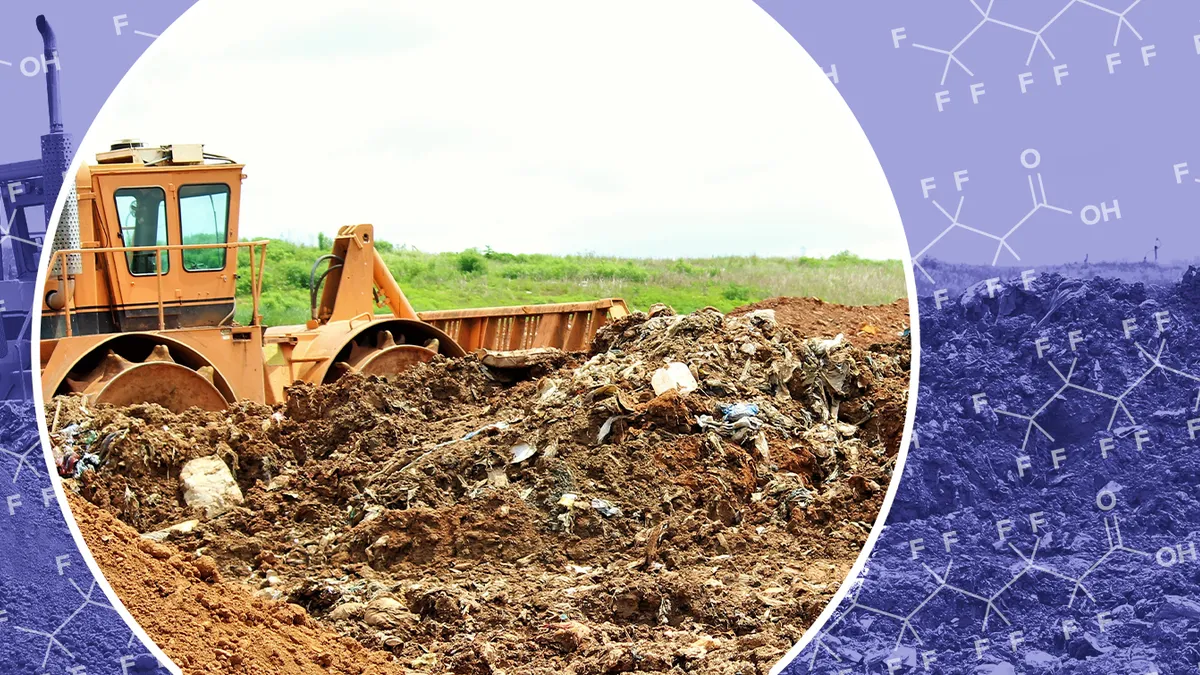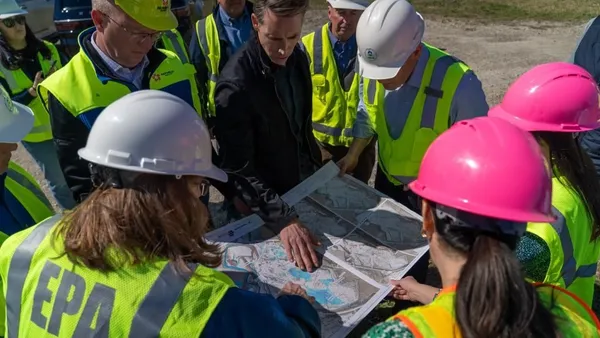Dive Brief:
- Testing from the Vermont Department of Environmental Conservation (DEC) released recently showed per- and polyfluoroalkyl substances (PFAS) were in 95% of waste samples from throughout the state. This included the Coventry landfill, owned and operated by Casella Waste Systems, where the toxic "forever chemicals" were found in all samples.
- Despite the evident contamination, the DEC found "that a small fraction of the PFAS entering the landfill in wastes leave it in leachate." But VTDigger reported high readings for PFAS have been found at two local wastewater treatment plants. One, in Montpelier, took significant levels of leachate from Coventry. The other in Newport no longer accepts the landfill's leachate, but did during the period measured by DEC.
- Kasey Kathan, an analyst with DEC, told Waste Dive some of Vermont's PFAS monitoring reports have been completed "in collaboration with Casella" and the state is working with the company on the issue.
Dive Insight:
PFAS are extraordinarily prevalent in waste sites and landfill operators in particular are struggling to get a hold on the situation across the country. Despite pressure from health and environmental groups, the U.S. EPA currently offers only an advised limit in drinking water of 70 parts per trillion (ppt) on the two most notorious PFAS – PFOA and PFOS.
Vermont is among states taking an increasingly aggressive approach to regulating the chemicals, which have been linked to cancer and a number of other stark health risks. Under Act 21, passed last year, the state set drinking water standards at 20 ppt for several types of PFAS. Vermont is also in the process of testing all public water systems for the substances, leading to scrutiny of landfills.
As part of its analysis at Coventry, the DEC report looked at transfer stations in East Montpelier, Williston, Hyde Park, Rutland, and Arlington. Furniture, textiles and carpet were among the major PFAS sources. Three closed and capped landfills were also tested. While Vermont maintains the chemicals largely appear to be contained, leachate contamination remains a concern. Wastewater treatment plants do not have the capacity to deal with PFAS, which do not break down and are notoriously hard to destroy.
"This has been a topic we've been having conversations about for quite awhile," said Terri Goldberg, executive director for the Northeast Waste Management Officials’ Association (NEWMOA).
She told Waste Dive more and more New England states are looking at testing landfill leachate for PFAS. "Obviously, states are pretty concerned about any kind of spreading," Goldberg said, referring to contamination of water sources via treatment plants.
Casella did not respond to a request for comment, but the company's work with DEC reflects wider industry acknowledgement of this evolving issue. A primary concern of landfill operators has been the cost of addressing PFAS contamination should it fall on the waste industry. Some, including a group formed last year in Wisconsin, argue manufacturers should shoulder the burden.
That scenario is already underway in some states. Michigan Attorney General Dana Nessel announced a massive lawsuit against 17 PFAS manufacturers in January, seeking damages. Cleanup in Michigan is proving expensive, meanwhile, and costs addressing PFAS contamination in five Kalamazoo County sites alone have already exceeded $1 million, including a now-closed landfill and recycling center. Officials found PFAS near the site of a former landfill in Portage last summer and have expressed concern about the contamination migrating beyond the area and impacting well water.
New Hampshire's aggressive PFAS standards have meanwhile generated legal pushback from entities including composter Resource Management. The state's environmental department is investigating at least six landfills over PFAS in groundwater. Maine's PFAS task force is similarly eyeing drinking water contamination connected to landfills.
The issue is also becoming a factor for organics processors. Reports of PFAS in compost led the Biodegradable Products Institute to issue new standards around the chemicals. Goldberg of NEWMOA also said states have questions about anaerobic digesters, and whether PFAS may be in emissions or biosolids.
At the federal level, Democratic lawmakers – including Vermont Sen. Bernie Sanders – unveiled a bill targeting the chemicals at the end of January. That legislation would designate PFAS as hazardous substances under Superfund law, triggering cleanup requirements with landfills likely included in those efforts. In addition to prohibiting the use of PFAS in food packaging and containers, the bill would ban the incineration of PFAS-laden firefighting foam.














